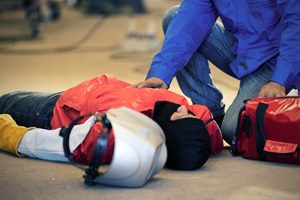Workers’ Compensation Benefits Are Available to Off the Books Employees
 For a variety of reasons, your employer may choose to pay you “off the books,” i.e., without running your wages through the company payroll. Your employer may want to avoid withholding taxes for you, or may want to avoid paying minimum wage. You may be only a part-time employee, so your employer considers your relationship similar to that of an independent contractor. But what happens if you are injured on the job? Are you without recourse to cover any disability or medical expenses that may arise?
For a variety of reasons, your employer may choose to pay you “off the books,” i.e., without running your wages through the company payroll. Your employer may want to avoid withholding taxes for you, or may want to avoid paying minimum wage. You may be only a part-time employee, so your employer considers your relationship similar to that of an independent contractor. But what happens if you are injured on the job? Are you without recourse to cover any disability or medical expenses that may arise?
In New Jersey, the test to qualify for workers’ compensation benefits is essentially two-fold: you must have been working at the time, and you must have been injured on the job. Accordingly, if you performed all the duties of an employee, but were simply not called one, you will still be able to seek workers’ compensation benefits from your employer.
If you were truly an independent contractor, however, you may be excluded from receiving workers’ compensation benefits. But don’t rely on your employer’s verbal statement that you were an independent contractor. In fact, even if you have a written agreement that calls you an independent contractor, the workers’ compensation judge will look at the actual relationship you had, as well as the nature of your work, to determine if you were really an employee.
Among the key questions that will be asked are:
- How much control did the employer exercise over your time and your assignments? The more the employer controlled both, the greater the likelihood of an employer-employee relationship
- Did you provide your own equipment and tools? If your employer provided those items, you were probably an employee.
- Was the work performed an integral part of the employer’s business? If so, you were probably an employee.
Contact Us
At Taylor & Boguski, we bring more than 70 years of combined legal experience to injured people throughout New Jersey. For a free initial consultation, contact our office online or call us at 856-200-8989.


 In New Jersey, after a job-related injury, you can apply for disability and medical benefits under the state’s
In New Jersey, after a job-related injury, you can apply for disability and medical benefits under the state’s